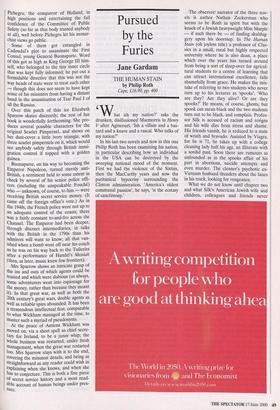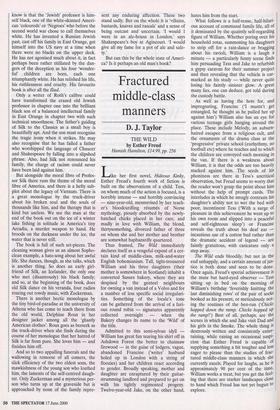Pursued by the Furies
Jane Gardam
THE HUMAN STAIN by Philip Roth Cape, £16.99, pp. 400 What ish my nation?' asks the drunken, disillusioned Macmorris in Henry V after Agincourt. `Ish a villain and a bas- tard and a knave and a rascal. Who talks of my nation?'
In his last two novels and now in this one Philip Roth has been examining his nation, in particular describing how an individual in the USA can be destroyed by the sweeping national mood of the moment. First we had the violence of the Sixties, then the MacCarthy years and now the puritanical hypocrisy surrounding the Clinton administration. 'America's oldest communal passion', he says, 'is the ecstasy of sanctimony.' The observer/ narrator of the three nov- els is author Nathan Zuckerman who seems to be Roth in spirit but with the knack of a Jewish heavyweight Miss Marple — if such there be — of finding skuldug- gery upon his doorstep. In The Human Stain (oh joyless title) a professor of Clas- sics in a small, rural but highly respected university where he is also dean, a place which over the years has turned around from being a sort of sleep-over for agricul- tural students to a centre of learning that can attract international excellence, falls shamefully from grace. He makes the mis- take of referring to two students who never turn up to his lectures as 'spooks'. 'Who are they? Are they alive? Or are they spooks?' He means, of course, ghosts, but spook can mean black and the two students turn out to be black, and complain. Profes- sor Silk is accused of racism and resigns and his wife dies from stress and shame. His friends vanish, he is reduced to a state of wrath and bravado. Assisted by Viagra, for he is 71, he takes up with a college cleaning lady half his age, an illiterate with a sordid past. Soon there are rumours as unfounded as in the spooks affair of his part in abortions, suicide attempts and even murder. The cleaner's psychotic ex- Vietnam husband thunders about the lanes in his truck, looking for vengeance. What we do not know until chapter two and what Silk's American Jewish wife and children, colleagues and friends never know is that the 'Jewish' professor is him- self black, one of the white-skinned Ameri- can 'coloureds' or 'Negroes' who before the second world war chose to call themselves white. He has invented a Russian Jewish past, cast off his family in East Orange, got himself into the US navy at a time when there were no blacks on the upper deck. He has not agonised much about it, in fact perhaps been rather titillated by the dan- gers of the deception as his four 'wonder- ful' children are born, each one triumphantly white. He has relished his life, his ruthlessness and cruelty. His favourite book is after all the Iliad.
Only a writer of Roth's calibre could have transformed the crazed old Jewish professor in chapter one into the brilliant black son of a balanced intellectual family in East Orange in chapter two with such technical smoothness. The father's guiding of Silk to the Classics as a small boy is beautifully apt. And the son must recognise the tragic irony when it strikes. He may also recognise that he has failed a father who worshipped the language of Chaucer and Shakespeare by falling into a slipshod phrase. Also, had Silk not renounced his family, the charge of racism could never have been laid against him.
But alongside the moral fibre of Profes- sor Silk there runs the theme of the moral fibre of America, and there is a hefty sub- plot about the legacy of Vietnam. There is a great monologue by the truck-driver about his broken soul and the souls of thousands like him, and the therapy that is kind but useless. We see the man at the end of the book out on the ice of a winter lake fishing in solitude in America's tiny Arcadia, a murder weapon to hand. He broods on the darkness under the ice, the water that is never still.
The book is full of such set-pieces. The cleaning woman gives us an almost Sopho- clean example, a hate-song about her awful life. She dances, though, as she talks, which is another thing. So does an early girl- friend of Silk, an Icelander, the only one who met (disastrously) his black family; and so, at the beginning of the book, does old Silk dance on his veranda, four radios roaring out rowdy music, with Zuckerman.
There is another hectic monologue by the tiny bird-of-paradise at the university of Athena who has come to teach there from the old world, Delphine Roux in her designer jacket among all the 'ghastly American clothes'. Roux goes as berserk as the truck-driver when she finds during the course of her monologue that her hatred of Silk is far from pure. She loves him — and finishes him off.
And so to two appalling funerals and the wallowing in remorse of all comers, the slick efficiency of the two eldest sons, the mawkishness of the young son who loathed him, the laments of the self-centred daugh- ter. Only Zuckerman and a mysterious per- son who turns up at the graveside but is approached by none of the family repre- sent any enduring affection. These two stand sadly. But on the whole it is 'villains, bastards, knaves and rascals' and a sense of being outcast and uncertain. 'I would I were in an ale-house in London,' says Shakespeare's boy at Agincourt. 'I would give all my fame for a pot of ale and safe- tY., But can this be the whole state of Ameri- ca? Is it perhaps an old man's book?











































































 Previous page
Previous page